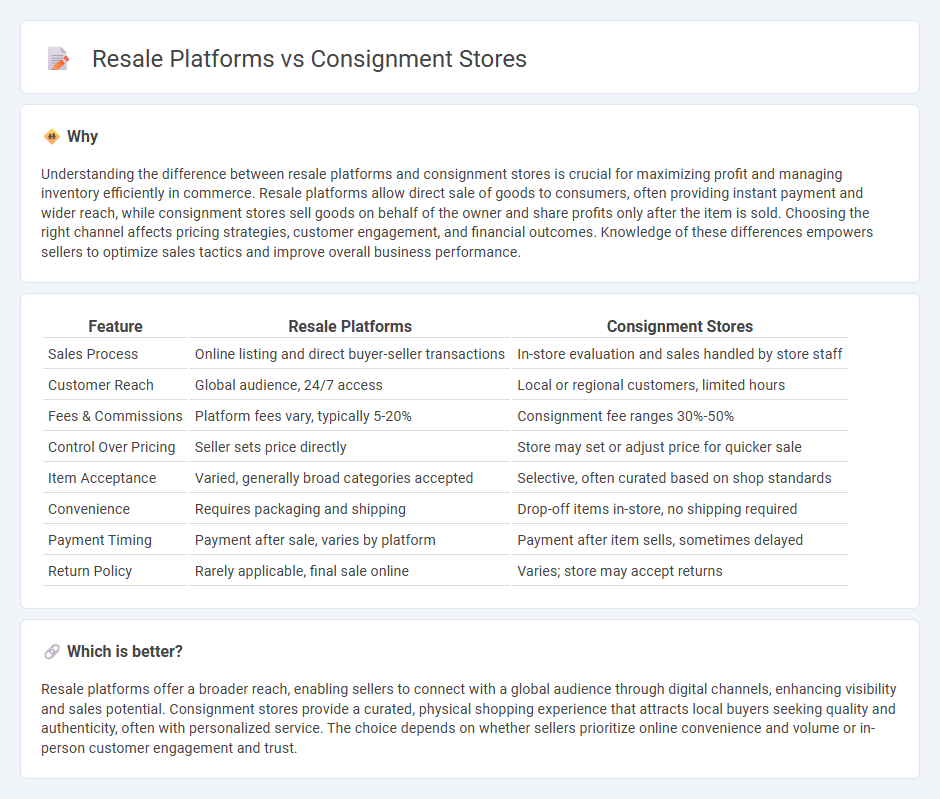
Resale platforms offer a dynamic online marketplace where individuals can directly buy and sell pre-owned goods, leveraging broad accessibility and convenience. Consignment stores operate through curated physical locations, providing expert quality control and higher trust in product authenticity. Explore the differences and advantages of each to determine the best option for your buying or selling needs.
Why it is important
Understanding the difference between resale platforms and consignment stores is crucial for maximizing profit and managing inventory efficiently in commerce. Resale platforms allow direct sale of goods to consumers, often providing instant payment and wider reach, while consignment stores sell goods on behalf of the owner and share profits only after the item is sold. Choosing the right channel affects pricing strategies, customer engagement, and financial outcomes. Knowledge of these differences empowers sellers to optimize sales tactics and improve overall business performance.
Comparison Table
| Feature | Resale Platforms | Consignment Stores |
|---|---|---|
| Sales Process | Online listing and direct buyer-seller transactions | In-store evaluation and sales handled by store staff |
| Customer Reach | Global audience, 24/7 access | Local or regional customers, limited hours |
| Fees & Commissions | Platform fees vary, typically 5-20% | Consignment fee ranges 30%-50% |
| Control Over Pricing | Seller sets price directly | Store may set or adjust price for quicker sale |
| Item Acceptance | Varied, generally broad categories accepted | Selective, often curated based on shop standards |
| Convenience | Requires packaging and shipping | Drop-off items in-store, no shipping required |
| Payment Timing | Payment after sale, varies by platform | Payment after item sells, sometimes delayed |
| Return Policy | Rarely applicable, final sale online | Varies; store may accept returns |
Which is better?
Resale platforms offer a broader reach, enabling sellers to connect with a global audience through digital channels, enhancing visibility and sales potential. Consignment stores provide a curated, physical shopping experience that attracts local buyers seeking quality and authenticity, often with personalized service. The choice depends on whether sellers prioritize online convenience and volume or in-person customer engagement and trust.
Connection
Resale platforms and consignment stores both facilitate the sale of pre-owned goods, enabling consumers to buy and sell items sustainably while extending the lifecycle of products. They operate on a business model that takes a commission or fee from sales, creating a shared economic ecosystem that benefits sellers, buyers, and the environment. Integration of digital resale platforms with physical consignment stores enhances inventory management and customer reach, driving growth in the circular commerce market.
Key Terms
Inventory Ownership
Consignment stores maintain ownership of inventory until items sell, allowing sellers to retrieve unsold products or receive payment post-sale, whereas resale platforms typically require sellers to list items independently with ownership transferring upon sale. Inventory control in consignment stores offers personalized management and quality assurance, while resale platforms provide broader reach but less oversight. Explore the contrasts between consignment and resale inventory ownership to choose the best selling strategy for your needs.
Pricing Control
Consignment stores generally offer sellers less pricing control, as store managers set prices based on market demand and item condition to optimize sales velocity. Resale platforms empower sellers with full pricing autonomy, allowing for strategic adjustments according to trends and competition, often leading to higher potential profits. Explore the advantages of each approach to determine the best pricing strategy for your resale business.
Revenue Model
Consignment stores generate revenue by taking a percentage of sales from physical retail locations, often charging fees upfront or on sold items, which provides a steady income tied to in-person transactions. Resale platforms leverage digital marketplaces, using commission-based models, listing fees, or subscription plans to maximize profitability with lower overhead and broader customer reach. Explore the intricacies of each revenue model to determine the best fit for your resale business.
Source and External Links
Crossroads Trading - A chain of consignment stores across the US where you can sell, buy, and trade current, on-trend clothing and accessories in excellent condition for cash or store credit, with 38 locations nationwide.
Poshmark - An online consignment platform that lets you quickly list your unused clothes and accessories from your phone, share listings with a community, and earn cash when your items sell, featuring easy shipping and payment protection.
Best Online Consignment Stores - Reviews of top online consignment shops like The RealReal, which specializes in luxury designer items and handles authentication and sales for sellers, though it charges higher commissions.
 dowidth.com
dowidth.com